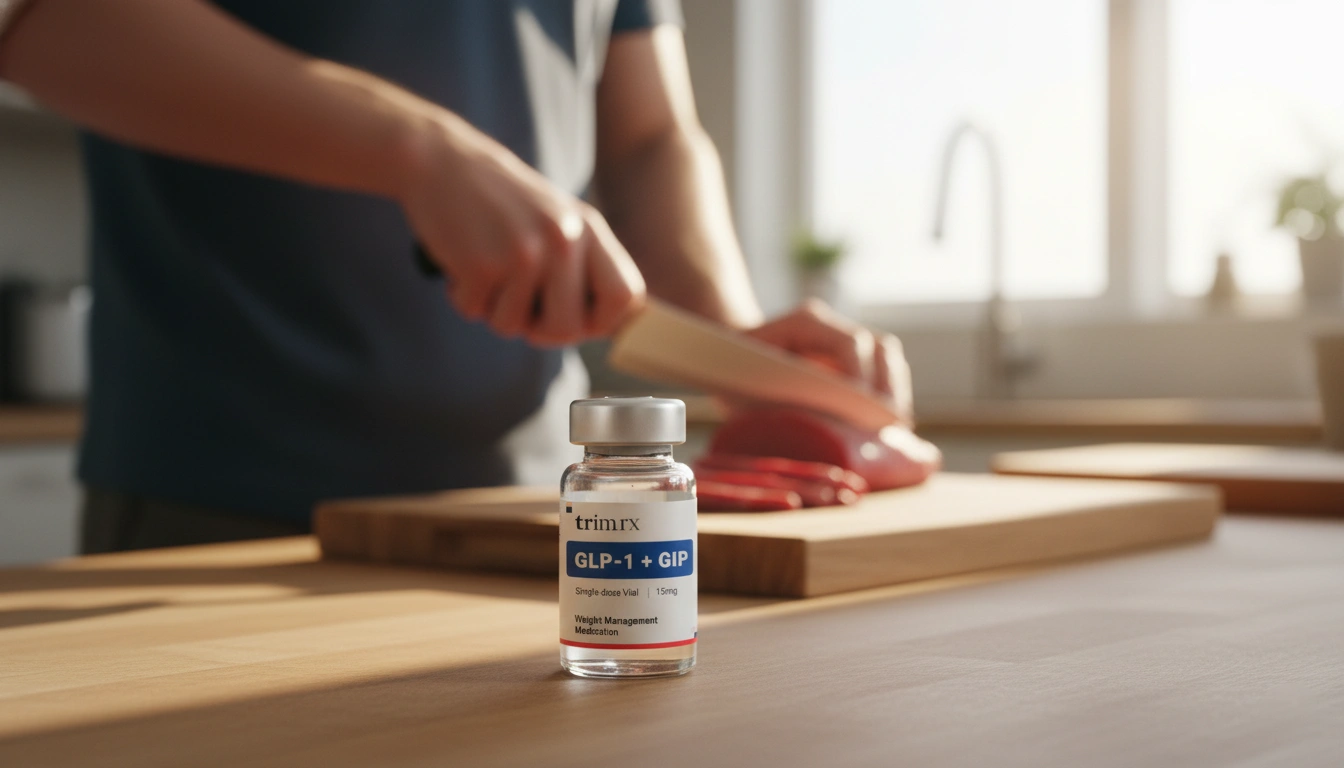Are GLP-1 Medications Dangerous? Exploring the Benefits and Risks

Introduction
Imagine a medication that not only helps you shed pounds but also contributes to better blood sugar control and even enhances cognitive function. This is the allure of GLP-1 medications, which mimic a hormone involved in appetite regulation and glucose metabolism. However, with such promising benefits come questions and concerns about their safety.
The landscape of weight loss solutions has evolved dramatically, with GLP-1 medications emerging as a cornerstone in managing obesity and type 2 diabetes. Initially developed to treat diabetes, these medications are now being utilized for weight management, leading to a spike in prescriptions. While many individuals experience significant benefits, it’s crucial to examine the full spectrum of effects these medications can have on the body.
In this post, we will cover the following points:
- What Are GLP-1 Medications?
- How Do GLP-1 Medications Work?
- Benefits of GLP-1 Medications
- Potential Risks and Side Effects
- Monitoring and Managing Risks
- TrimRx’s Approach to Personalized Care
- Conclusion and FAQs
By the end of this blog, you’ll have a clearer picture of the complexities surrounding GLP-1 medications and their impact on health.
In recent years, glucagon-like peptide-1 receptor agonists (GLP-1RAs) have surged in popularity, often being hailed as “miracle drugs” for weight loss and diabetes management. Statistics show that around one in eight Americans has either used or is currently using these drugs, which include well-known names like Ozempic and Wegovy. While the efficacy of these medications is widely recognized, there are growing concerns about their safety and potential risks. We’re here to delve into the question: Are GLP-1 medications dangerous?
In this blog post, we will explore the mechanisms of GLP-1 medications, their benefits, and the associated risks. We aim to provide you with a comprehensive understanding of these medications so you can make informed decisions about your health journey. We will also highlight how TrimRx supports individuals on their weight loss journey through personalized, medically supervised care and FDA-registered medications.
What Are GLP-1 Medications?
GLP-1 medications are a class of drugs known as glucagon-like peptide-1 receptor agonists. They work by mimicking the natural GLP-1 hormone produced in the gut, which is released after eating. This hormone plays a vital role in regulating appetite and blood sugar levels.
Several GLP-1 medications have received FDA approval for use, including:
- Semaglutide (brand names: Ozempic, Wegovy)
- Liraglutide (brand names: Victoza, Saxenda)
- Tirzepatide (brand name: Mounjaro)
- Dulaglutide (brand name: Trulicity)
These medications have been shown to effectively lower blood sugar levels in individuals with type 2 diabetes and promote weight loss in those with obesity.
How Do GLP-1 Medications Work?
GLP-1 medications function through several mechanisms:
- Increased Insulin Secretion: They stimulate the pancreas to release insulin in response to food intake, helping to lower blood sugar levels.
- Decreased Glucagon Release: By suppressing glucagon, these medications prevent the liver from producing too much glucose.
- Slowed Gastric Emptying: GLP-1 medications slow down the emptying of the stomach, leading to prolonged feelings of fullness after meals.
- Appetite Regulation: They act on the brain’s appetite centers to reduce hunger, making it easier for individuals to adhere to a reduced-calorie diet.
This multi-faceted approach not only aids in weight loss but also helps manage diabetes effectively.
Benefits of GLP-1 Medications
The benefits of GLP-1 medications extend beyond mere weight loss. Research has indicated several positive effects, including:
- Significant Weight Loss: Many users report substantial weight loss, which is crucial for individuals with obesity. Studies indicate that those using GLP-1 medications can lose between 10% to 20% of their body weight.
- Improved Blood Sugar Control: These medications help regulate blood sugar levels, reducing the risk of diabetes-related complications.
- Cardiovascular Benefits: Research has shown that GLP-1 medications can lower the risk of heart attacks and strokes in people with type 2 diabetes.
- Enhanced Cognitive Function: Emerging studies suggest potential cognitive benefits, including reduced risks of neurodegenerative diseases like Alzheimer’s and dementia.
While the benefits are compelling, it’s essential to remain aware of the potential risks associated with these medications.
Potential Risks and Side Effects
As with any medication, GLP-1 medications are not without risks. While many individuals tolerate these medications well, some reported side effects include:
- Gastrointestinal Issues: Nausea, vomiting, diarrhea, and constipation are among the most common side effects. These typically occur when starting the medication or increasing the dosage.
- Pancreatitis: There is a potential risk of pancreatitis, an inflammation of the pancreas that can cause severe abdominal pain.
- Kidney Issues: Some users have reported kidney problems, which can develop without noticeable symptoms until they become severe.
- Thyroid Tumors: Certain GLP-1 medications have been associated with an increased risk of thyroid tumors in animal studies, leading to warnings against their use in individuals with a history of medullary thyroid carcinoma.
- Mental Health Concerns: Some studies indicate that these medications may be linked to increased suicidal ideation, particularly in individuals with pre-existing mental health conditions.
It’s crucial to approach these medications with caution and consult with healthcare professionals to ensure they are suitable for your health status.
Monitoring and Managing Risks
Given the potential risks, regular monitoring while using GLP-1 medications is essential. Healthcare providers should conduct routine assessments, including:
- Blood Sugar Levels: Regular monitoring of blood sugar can help ensure that the medication is functioning as intended.
- Kidney Function Tests: Kidney function should be evaluated periodically, especially in individuals at higher risk.
- Monitoring for Pancreatitis Symptoms: Be aware of signs such as severe abdominal pain, nausea, or vomiting, and report these to a healthcare provider immediately.
At TrimRx, we prioritize patient safety by providing comprehensive services, including doctor consultations, lab work, and ongoing support. We believe in a transparent approach to medication management, ensuring that you are informed every step of the way.
TrimRx’s Approach to Personalized Care
At TrimRx, our journey began with a shared vision to help individuals embrace healthier lifestyles through innovative weight loss solutions. We understand that every individual’s journey is unique, which is why we offer personalized, medically supervised care tailored to your specific needs.
Our services include:
- Free Assessment Quiz: To determine eligibility for prescription weight loss medications, we encourage individuals to take our personalized assessment quiz. This helps us create a treatment plan that fits your lifestyle and health goals. Take our free assessment quiz here.
- Medication Provision: We partner with FDA-registered and inspected pharmacies to ensure safe and effective delivery of medications like Semaglutide and Tirzepatide.
- Ongoing Support: Our team is dedicated to providing compassionate care throughout your weight loss journey, offering consistent check-ins and support.
In addition to prescription medications, we also offer quick-access supplements, such as GLP-1 Daily Support and Weight Loss Boost, to help enhance your weight loss journey. Explore our supplements here. and Weight Loss Boost here..
FAQ
In conclusion, while GLP-1 medications offer promising benefits for weight loss and diabetes management, they are not without potential risks. It’s vital to approach these medications with care and under the guidance of a healthcare professional. At TrimRx, we are dedicated to providing personalized support for individuals embarking on their weight loss journeys.
FAQ
Are GLP-1 medications safe for everyone?
Not everyone is a candidate for GLP-1 medications. Individuals with a history of certain conditions, such as medullary thyroid carcinoma or pancreatitis, should avoid these medications. Always consult with a healthcare provider to assess your suitability.
How long do the effects of GLP-1 medications last?
The effects can vary between individuals, but many users experience sustained weight loss and improved blood sugar control as long as they continue their treatment and maintain a healthy lifestyle.
Can I take GLP-1 medications with other treatments?
GLP-1 medications can be combined with other treatments for diabetes or obesity, but it’s essential to work with your healthcare provider to develop a comprehensive plan.
What should I do if I experience side effects?
If you experience any concerning side effects while taking GLP-1 medications, contact your healthcare provider immediately for advice and management strategies.
Together, we can navigate the complexities of weight loss and health management, ensuring you achieve your goals safely and effectively. Remember, your health journey is unique, and we’re here to support you every step of the way.

Transforming Lives, One Step at a Time
Keep reading
China’s Supreme Court Upholds Semaglutide Patent for Novo Nordisk
China’s Supreme People’s Court upholds Novo Nordisk’s semaglutide compound patent, supporting IP protection.
Over 600,000 Californians Risk Losing Access to GLP-1 Weight-Loss Drugs
California’s Medi-Cal will stop covering GLP-1 weight-loss drugs for weight-loss-only prescriptions, effective Jan. 1, 2026.
Weight-Loss Pill Approval Likely to Prompt Overhaul of Packaged Food and Fast-Food Products
FDA approval of GLP-1 weight-loss pills may prompt food makers and restaurants to shift to high-protein, smaller-portion products.



